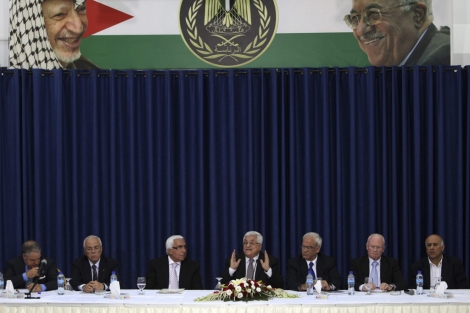The handshake join West Bank and Gaza and will take place in Cairo, but who is really behind Turkey. So says the Turkish daily Zaman, close to the ruling party, citing sources "government." Advance who will not reduce the merit of Egypt, the official mediator between the two Palestinian factions, but that "Turkey played a crucial role in the negotiations." In fact, on Wednesday evening, Turkish Foreign Minister, Ahmet Davutoglu, had a telephone conversation with Hillary Clinton, which urged him to "give full support" for reconciliation, he told Zaman.
According to this newspaper, the process began last March 31 when Davutoglu called the president of the Palestinian Authority, Abu Mazen and recommended that she talk with their Hamas rivals. On April 6, Davutoglu used his trip to Syria and meeting with President Bashar Assad to schedule a meeting with Khaled Meshal, the Hamas leader living in exile in Damascus.
According to the Hürriyet newspaper, Mashaal called Abbas to cede the post of president of the Palestinian Authority to a representative of Hamas, winner of the 2006 election. April 10, Davutoglu visited Cairo and met with Secretary General of the Arab League, Amr Musa. Also on this occasion, "the issue was on the agenda, diplomats say Turkish Zaman.
Hürriyet adds that it planned a meeting between Hamas and Fatah in Istanbul, which has now been canceled. "Turkey takes quite a while striving to bring the Palestinian factions," said Mensur Akgün, director of the Turkish GPOT analysis, but adds that "only the Palestinians can say how much heavy Turkish influence in the agreement." In any case, the success further reinforces the image of Turkey in the 'Arab street', when it raised last year from 80% sympathies.
For that reason "is not an image operation of Ankara, which does not make it any failure," says Akgün. "But the whole region will gain from this move towards peace." Israel has a very different, but the Turkish role in a deal that Tel Aviv and soon finds negative influence on bilateral relations, badly damaged after the incident at the Fleet last year, but that first alienated the two allies in 2008 was just the failure of peace negotiations between Syria and Israel in Turkey acted as a mediator.
Now, Ankara has resumed its role as an intermediary and although the aim is more modest, underscores the power back to the old Ottoman Eastern Mediterranean theater. 


According to this newspaper, the process began last March 31 when Davutoglu called the president of the Palestinian Authority, Abu Mazen and recommended that she talk with their Hamas rivals. On April 6, Davutoglu used his trip to Syria and meeting with President Bashar Assad to schedule a meeting with Khaled Meshal, the Hamas leader living in exile in Damascus.
According to the Hürriyet newspaper, Mashaal called Abbas to cede the post of president of the Palestinian Authority to a representative of Hamas, winner of the 2006 election. April 10, Davutoglu visited Cairo and met with Secretary General of the Arab League, Amr Musa. Also on this occasion, "the issue was on the agenda, diplomats say Turkish Zaman.
Hürriyet adds that it planned a meeting between Hamas and Fatah in Istanbul, which has now been canceled. "Turkey takes quite a while striving to bring the Palestinian factions," said Mensur Akgün, director of the Turkish GPOT analysis, but adds that "only the Palestinians can say how much heavy Turkish influence in the agreement." In any case, the success further reinforces the image of Turkey in the 'Arab street', when it raised last year from 80% sympathies.
For that reason "is not an image operation of Ankara, which does not make it any failure," says Akgün. "But the whole region will gain from this move towards peace." Israel has a very different, but the Turkish role in a deal that Tel Aviv and soon finds negative influence on bilateral relations, badly damaged after the incident at the Fleet last year, but that first alienated the two allies in 2008 was just the failure of peace negotiations between Syria and Israel in Turkey acted as a mediator.
Now, Ankara has resumed its role as an intermediary and although the aim is more modest, underscores the power back to the old Ottoman Eastern Mediterranean theater.



- How will The Quartet respond to the Fatah-Hamas deal? (30/04/2011)
- Will Obama give US taxpayer dollars to terrorist Hamas-Fatah unity govt? (30/04/2011)
- Hamas and Fatah: The Wedding That Mattered (29/04/2011)
- Arab World Revolution starts bearing fruits , Palestinian factions Hamas and Fatah signs a deal for Unity , to save the Gold Mine Gaza from Israel (30/04/2011)
- Fatah vs. Hamas: An Analogy (30/04/2011)
No comments:
Post a Comment